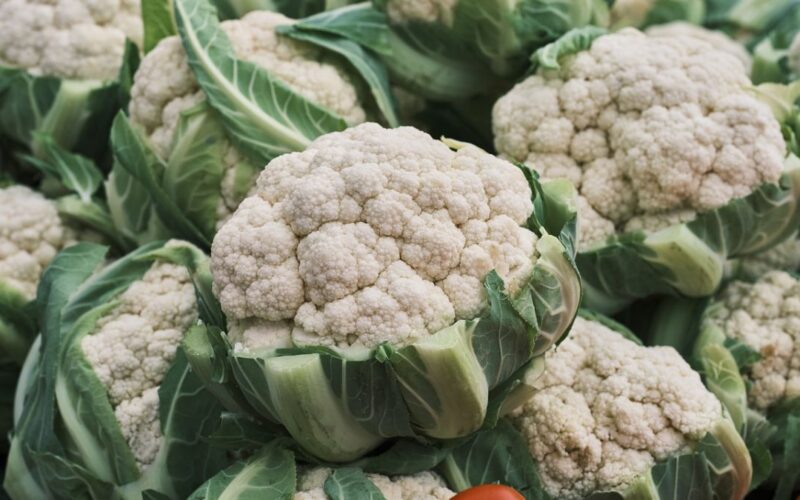Cauliflower might seem like an everyday vegetable, but there’s much more to this cruciferous powerhouse than meets the eye. Whether you’re a fan of roasted cauliflower or enjoying it as a low-carb rice substitute, this vegetable is full of surprises. Here are 10 fascinating facts about cauliflower that you probably didn’t know!
1: Cauliflower is a Member of the Cabbage Family
Cauliflower belongs to the Brassicaceae family, which also includes broccoli, kale, and cabbage. It’s the flowering head of the plant, which is why its appearance is a tightly clustered group of buds. This family of vegetables is known for its high nutritional value and health benefits, especially due to its rich content of vitamins and antioxidants.
2: It Comes in More Colors Than White
While most of us are familiar with the white variety, cauliflower comes in several vibrant colors, including purple, orange, and green. The purple variety gets its color from anthocyanins, the same antioxidants found in purple cabbage and red grapes. The orange variety is high in beta-carotene, which gives it its vibrant color and offers additional health benefits like improved eye health.
3: Cauliflower is Low in Calories, but High in Nutrients
Cauliflower is incredibly low in calories but packed with vitamins and minerals. A one-cup serving contains only about 25 calories, making it a great choice for anyone watching their caloric intake. It’s also a good source of Vitamin C, Vitamin K, folate, and fiber. Plus, it contains a range of phytonutrients that have been shown to have anti-inflammatory properties.
4: It’s a Fantastic Source of Fiber
If you’re looking to boost your fiber intake, cauliflower is a great option. A cup of cauliflower provides around 2-3 grams of fiber, helping to support digestive health and regulate bowel movements. Additionally, the fiber in cauliflower can help maintain blood sugar levels, making it an excellent choice for people with diabetes or anyone looking to stabilize their energy throughout the day.
5: Cauliflower Can Be Used as a Low-Carb Substitute
One of the most popular uses of cauliflower in recent years is as a low-carb substitute for grains and starches. Cauliflower rice, made by pulsing cauliflower florets into small, rice-like pieces, is a fantastic alternative to traditional rice. Similarly, cauliflower can be used in pizza crusts, mashed potato recipes, and even as a base for gluten-free bread.
6: It’s Rich in Antioxidants
Cauliflower is packed with antioxidants, particularly sulforaphane, a compound that is thought to have powerful anti-cancer properties. Studies suggest that sulforaphane may help protect cells from oxidative stress, which is linked to the development of chronic diseases, including cancer. So, eating cauliflower is not only good for your taste buds but also for your long-term health!
7: Cauliflower Has a Rich History
Cauliflower has been cultivated for centuries. It was first grown in the Mediterranean region around the 6th century, but it became more widely popular in Europe during the 16th century. It wasn’t until the 18th century that cauliflower began to spread to other parts of the world, where it became a staple in various cuisines.
8: It Can Help with Detoxification
Cauliflower is a natural detoxifier due to its high content of glucosinolates, sulfur-containing compounds that support the body’s detoxification pathways. These compounds help the liver in breaking down harmful substances and flush toxins from the body. So, when you add cauliflower to your diet, you’re not just eating something delicious, you’re also helping to cleanse your system.
9: Cauliflower is Versatile in Cooking
Cauliflower is one of the most versatile vegetables you can cook with. It can be steamed, roasted, boiled, or eaten raw in salads. Roasting cauliflower with a drizzle of olive oil, garlic, and spices brings out its natural sweetness and flavor. Additionally, cauliflower can be blended into soups, purees, or even made into a creamy sauce for pastas and casseroles.
10: It Supports Heart Health
The nutrients found in cauliflower, including fiber, potassium, and antioxidants, are excellent for heart health. Cauliflower has been linked to a reduction in the risk of heart disease by promoting healthy cholesterol levels, improving blood pressure, and supporting overall cardiovascular health. Eating cauliflower regularly can be an easy, delicious way to promote a healthy heart.
Cauliflower Is a Superfood in Disguise
Cauliflower is not just a healthy addition to your diet, it’s a true superfood. With its rich nutritional profile, low calorie count, and diverse uses, it’s no wonder this humble vegetable has gained popularity in recent years. So, whether you’re using it to create a keto-friendly meal or simply roasting it for a tasty side dish, cauliflower is an excellent choice for your health and your palate. Who knew that such a simple vegetable could pack so much power?










